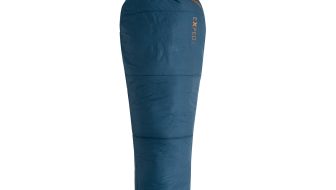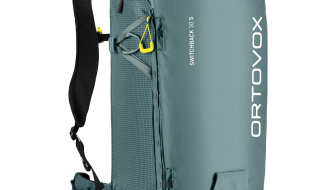While filming with Teton Gravity Research (TGR) this past spring in Pemberton, British Columbia, professional skier Nick McNutt was caught in an avalanche on March 9 after a large pillow in his line became dislodged. The slide carried McNutt into a section of trees and, given how the slope transitioned to a lake below, quickly stacked up a pile of debris, burying him.

Other members on the trip, including Ian McIntosh, Sam Smoothy, Ben Dann, Eric Parker and Christina Lustenberger, who recently shared news of the incident in a quickly circulated series of Instagram posts on October 7, began searching for McNutt but were unable to find a beacon signal. Dann was able to locate McNutt with a probe strike, and the team recovered him within five minutes of the burial. After a call to SAR, McNutt was evacuated to Pemberton’s medical clinic.
Upon rescue, the party noted that McNutt’s beacon, a Pieps DSP Pro—which has a push-button lock mechanism on its face and was worn in a chest harness—was switched to off.
“The experience left me questioning the integrity of the Pieps DSP Pro,” Lustenberger, a ski guide certified through the Association of Canadian Mountain Guides (ACMG), wrote in her fourth Instagram post detailing the accident. “A few days after the incident I sent an email to the guiding community enquiring about similar experiences or issues with this device.”
“I was surprised to see my email flooded with similar accounts, even dating back to 2017. The problem being it can switch modes easily without the user’s knowledge,” she continued. “Due to poor design the button wears out and no longer provides resistance allowing it to slide out of send mode.”
Lustenberger’s posts, shared widely including on Backcountry’s Instagram stories, soon garnered a response from Pieps regarding their DSP Sport and DSP Pro transceivers. “These beacons have undergone vigorous testing and exceed all certification standards. They have been sold globally since 2014 and used by countless backcountry travelers ever since,” the company’s Oct. 14 statement read.
“A beacon is a personal safety tool which must be properly used and maintained. Any misuse may compromise its functionality,” the statement continued. “Your safety in the backcountry is our top priority. Please reach out to Black Diamond Equipment in North America and Pieps in Europe if you need further information or if you are unsure how to verify the condition of your beacon.”
On Oct. 19, Pieps released another statement, offering an upgrade to their latest generation of avalanche transceivers for those owning a DSP Sport or Pro.
As of October 21, Rice Harbut Elliott LLP, a Vancouver, B.C. personal injury law firm, has filed a claim against Black Diamond Equipment LTD., Clarus Corporation, Pieps GMBH and Pieps Canada in a potential class action lawsuit. The potential lawsuit claims defective beacon design and manufacturing and is on behalf of Canadians who, per the Rice Harbut Elliott website, have purchased “one more of the following: Black Diamond Recon BT; Black Diamond Guide BT; Pieps DSP Sport; Pieps DSP Pro; Pieps Powder BT; and Pieps Pro BT.”
No one involved in McNutt’s March slide is partaking in this claim. Instead, as McIntosh outlined in an October 20 Instagram video, the group’s focus lies in calling for a recall or buy-back of Pieps DSP Sport and Pro transceivers. Both beacons feature a push-button lock mechanism, which McIntosh explains can be easily and mistakenly switched off. He goes on to show how his personal beacon, a Black Diamond Guide BT, has a slide-lock mechanism—versus the Pieps DSP Sport or Pro’s push-button lock—which prevents such easy switching off.
Since the incident, members of their group have been in touch with Black Diamond and Pieps, but, after not receiving the feedback they said they were looking for, went public this fall. According to a representative with Black Diamond, the sister company of Pieps that distributes Pieps products in the U.S., Pieps and Black Diamond engaged in roughly 20 hours of conversation with McNutt and team. The Pieps DPS Sport and Pro are not currently for sale through Black Diamond’s website.
“We wanted to take the high road,” McIntosh says in his October 20 post. “Here we are, winter’s fast approaching, our TGR film is out with Nick’s incident in it, and we couldn’t wait any longer. It was time to create some education around what’s going on and make people aware that this transceiver should not be trusted.”
We will continue to update this story as it develops.










Is this not the same problem, brought up in March of 2019 on backcountry.com review of the BD Guide
https://www.backcountry.com/black-diamond-guide-bt?skid=BLD00U5-ONECOL-ONESIZ&ti=U2VhcmNoIFJlc3VsdHM6YmxhY2sgZGlhbW9uZCBiZWFjb246MToxOmJsYWNrIGRpYW1vbmQgYmVhY29u
🙁